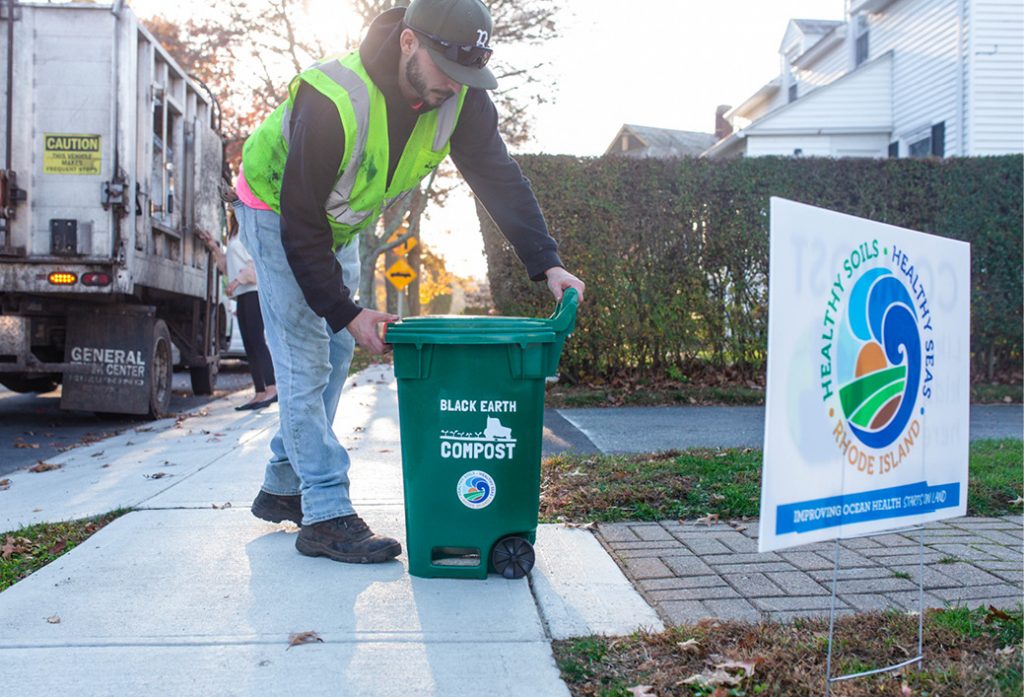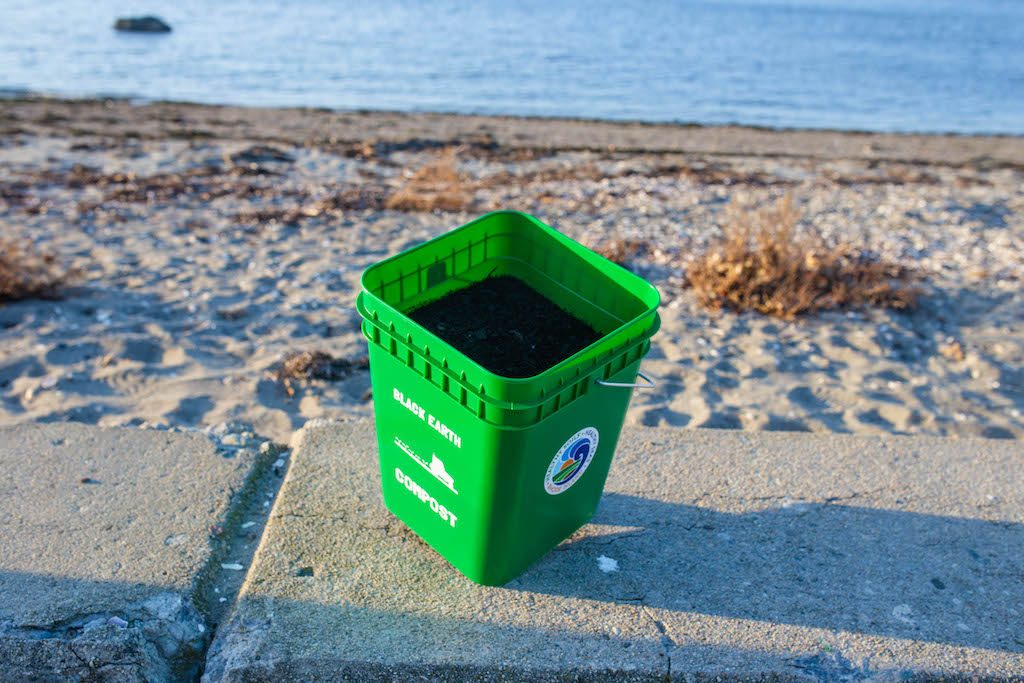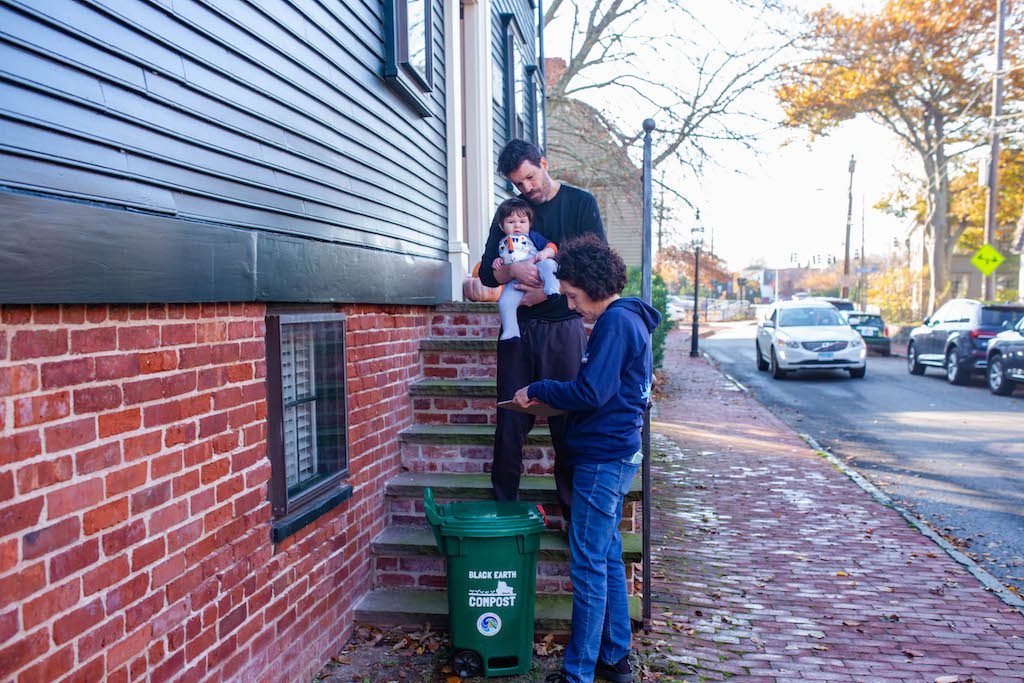By Emily Conklin, Clean Ocean Access Communications Marketing Coordinator

Black Earth Compost offers biweekly curbside pickup, allowing residential customers an easy, affordable option to responsibly dispose of their food scraps.
On a windy, freezing day in February, Program Coordinator Casey Tremper shepherds volunteers removing litter at Second Beach in Middletown, RI. The beach looks clean, and most volunteers don’t seem to think they’ll find much. Casey knows better and sends them out to search the beach, grass, roadsides, and rock crevices; by the end of the day, the team has collected over 70 pounds of bottles, wrappers, and plastic debris. When they turn in their supplies, one couple is shocked at how much they collected. These locals love visiting the beach all year round, and want to know what else they can do to support ocean health. Casey asks if they’ve considered joining our composting program, and gets a response we’ve come to expect: “What does composting have to do with ocean health?” This is one of our favorite questions to answer.
Since December 2018, Clean Ocean Access (COA) has spearheaded the Healthy Soils Healthy Seas Rhode Island (HSHSRI) initiative, with support from our funder 11th Hour Racing and partners The Compost Plant, the Center for EcoTechnology, and Black Earth Compost. Together, we work to bring composting to communities across Rhode Island to foster environmental stewardship and diversion of waste from the central landfill.
COA is a Middletown, RI-based nonprofit with a mission to inspire and educate the community to take action through environmentally responsible behaviors. HSHSRI connects our treatment of waste on land with the impact we can have on our coastlines, highlighting composting as one of many easy changes we can make in our daily lives to be more eco-friendly. Composting shifts our waste stream from a linear “make, take, waste” model to a circular “take, make, reuse” model, where inputs are transformed to a new, usable product, rather than thrown in the landfill. In this case, the inputs are food scraps, and the usable product is finished compost that acts as a soil amendment. We are now in the third grant cycle of HSHSRI with a goal to activate 2,000 households through our curbside composting program with Black Earth Compost.

Food scraps are turned into a nutrient rich soil amendment that can be used in gardening, lawn maintenance – wherever there’s soil! – to increase water retention, reduce runoff, and create a healthier ecosystem.
Composting in your home has a noticeable impact on your household’s waste production. Over one third of all municipal waste in Rhode Island is compostable. 1. Currently, over 100,000 tons of food waste is buried in RI’s central landfill each year. Once it’s in the landfill, food waste decomposes in the absence of oxygen, producing methane, a greenhouse gas that is 84 times more potent than carbon dioxide. Contrast this with composting, where food waste is broken down in the presence of oxygen, producing fewer emissions and creating a soil amendment that helps store carbon in the soil.
From the beginning of our efforts through January 2021, we have diverted over 600,000 pounds of residential food scraps from the landfill. Separating out food scraps also provides the opportunity to notice what you are consuming and what you are wasting. Much of the trash that can’t be composted or recycled is low-value, single-use items like food wrappers. These same items are what we find most often as litter during our beach cleanups. By asking you to think critically about your waste footprint, HSHSRI and our curbside composting program aim to spark long-lasting behavior changes that empower you to reevaluate the need for low-and-no value materials that enter the landfill, or worse, end up polluting our oceans.
What does that behavior change really mean for ocean health? Reducing the use of single-use materials reduces the chance that they will end up as coastal or marine debris. On an ecological level, composting helps reduce methane emissions that contribute to climate change. Warming atmospheric temperatures cause warmer oceans, which negatively impacts water quality and marine life. Instead of warming our oceans from the landfill, composting food scraps results in a nutrient rich soil amendment that enhances our soils and protects our watersheds.

Newport residents confer with COA Project Leader Egidia Vergano about what can go in their compost bin and their ongoing home diversion rate.
As the HSHSRI name says, when our soils are healthy, our seas are healthy, too. Using finished compost in our gardens, lawns, and fields adds nutrients, which not only reduces the need for chemical fertilizers, but also protects against erosion, improves water retention, and reduces stormwater runoff. Altogether, the advantages of compost help keep pollutants out of the ocean and strengthen the structure of the coastline. The potential impacts are astounding – all from separating your food scraps into a little green bin instead of your trash!
Back on the beach, Casey fills our volunteers in on the highlights of what a big difference composting can make. When dedication to cleaning the beach translates to dedication to separating out food scraps, we may have less marine debris to clean! Our partnership with Black Earth Compost makes composting at home easy, accessible, and affordable. In 2022, we are working to bring our community of curbside composters up to 2,000 members. As we can see from our beach cleanups, everything is connected. Improving ocean health starts on land, and it starts with every one of us. We hope you’ll join us. ■
1 Data courtesy of Rhode Island Resource Recovery Center, 2021 via http://www.rirrc.org/.
To learn more about the HSHSRI initiative and to sign up for curbside composting, visit cleanoceanaccess.org/hshsri/



